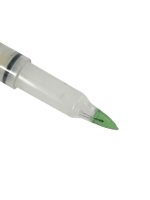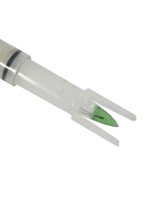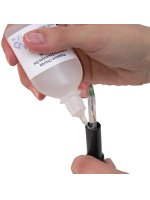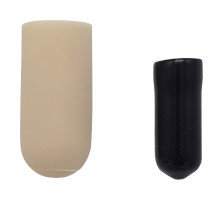COMBINATION pH ELECTRODES IJ44A, IJ44At
Electrodes IJ-44A and IJ44At have a unique, specific construction which enables measurements in various samples of both pure and contaminated liquids, soil and semi-solids without the threat of clogging the junction. This electrode enables pH measurements in very wide range of samples. WATER, WASTEWATER, CONTAMINATED SAMPLES, COSMETICS, DETERGENTS, ORGANIC MATERIALS, PROTEINS, LUBRICANTS, OILS, WINE, MEAT, CHEESE..... ALL THIS MAY BE MEASURED WITH ONE ELECTRODE! This electrodes shouldn't be used for measurements of distilled or deionised water. The IJ44A model is characterised by a fast reaction in clean water and low temperature samples. Has a very good mechanical resistance. The IJ44At it is identical as IJ44A except it has a built in temperature probe Pt-1000B The construction of the electrodes is unusual, precisely fitted sleeve put on the end of electrode creates an "intermediate junction” what protects the real junction (diaphragm) of the electrode against clogging, ensures stable measurements in these types of liquids or semi-liquid mass, in which other electrodes quickly stop working. Such construction is highly resistant to clogging by fats, proteins or other sediments. Elements of glass electrodes are protected by a plastic body. Plastic sleeve which protects the junction is an integral part of the electrode. It is impossible to use the electrode without the sleeve. The sleeve may be exchanged and it's kind depends on the type of the measured sample. For storing and activation a rubber cap filled with distilled water is be put on the membrane. Machine processing of the glass ensures high precision of matching elements in glass and plastic electrode, which is a must for a proper operation. When properly handled, the electrode's lifetime is longer than the standard electrodes. The average lifetime 2 to 4 years Periodically, on average every 1 month, the sleeve should be removed, the exposed collar flushed to remove the old gel and new gel should be poured in. The conical membrane is hardened, what allows it to be used for direct penetration measurements, e.g. in meat or cheese. The electrode does not contain mercury and fits directly into Eppendorf tubes. Plastic body protect the electrode against breaking. We pay your attention to the favourable price, much lower than the price of electrodes for similar purposes offered by their companies.
Technical Data
| pH range | 0 ÷ 14 pH |
|---|---|
| Zero point | 7.0 ±0.4 pH |
| Membrane | Glass, conical |
| Working temperature range | 0 ÷ 60 °C |
| Junction type | "intermediate" junction |
| Electrolyte | 3 M KCl gel |
| Impedance | < 120 MΏ (25 °C) |
| Diameter | 12.0 mm ±0.5 mm |
| Length | 120 mm ±5 mm |
| Minimal immersion level | 20 mm |
| Maximal immersion level | 100 mm |
| Body material | polypropylene |
| Cable length | about 1 m |
| Connector | BNC-50 + RCA in IJ44At |







